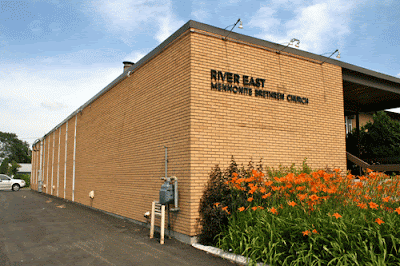A chance to “tell our story in our own way.” That was the goal of the November 26 gathering at River East Church in Winnipeg.
The event, titled “River East’s Journey to Inclusion,” was attended by 172 people in person with 173 screens on Zoom.
The meeting was opened by church member Jan Schmidt, who said the event was being held, in part, to dispel some rumours circulating about why River East had decided to become welcoming and affirming of LGBTQ+ people.
This included the ideas that the topic was being “pushed through by one person,” that the church was no longer Christian, that it had ignored the Bible in making the decision and that its guiding principle was the Canadian Charter of Human Rights.
Since there was no other forum to dispel these rumours, the church decided to create its own, she said.
The other goal of the meeting was to share the story with those who will be voting to keep or expel the church at a special meeting of the Mennonite Brethren of Church Manitoba on January 20.
“We are hoping those who will be at that meeting deciding our future will take time to hear our story,” Schmidt said.
Schmidt noted that some people might be wondering why River East just doesn’t leave; why wait for a vote?
“The answer for me is this is my family of faith,” she said. “You all mean a lot to us.”
She went on to say that the decisions made by the church were not done quickly or haphazardly. “It was a process that led us to decision,” she said, adding it was “a slow process.”
The process started informally as far back as 2007, she said, and included Christian education classes on the subject and book studies.
The formal process started in 2019. It led to a vote asking if the church should welcome LGBTQ+ people “into every and all aspects of church life.” Ninety percent agreed.
Members were also asked if the church should place limits on LGBTQ+ congregants. 82 percent said no.
When asked if opposing viewpoints on LGBTQ+ inclusion should be allowed, “choosing unity above our differences,” 72 percent said yes.
That was followed by seven congregational meetings, with representatives from MBCM invited to all of them. The Leadership Commission also met four times to discuss the subject.
At the same time, the congregation asked itself what the Bible said on the subject “and then interpreted the Bible into our context,” she said, along with listening to the stories of people inside and outside of the congregation.
The church also created a document titled Talking Points About from the Bible for Full Inclusion of LGBTQ+ Persons.
The congregation continued to meet to talk about the subject through the pandemic. When finally asked to vote on a full inclusivity statement, almost 94 percent agreed with it.
That statement says that everyone is invited to be part of the church’s mission, “whatever their ability, age, ethnicity, family status, gender identity, income level, race, sexual orientation, or other identity distinctives. All are welcome to full participation in the journey of discipleship.” (Click here to read about the statement.)
Also at the meeting, River East pastor Aaron Thiessen explained how the church employed what’s called “the Gentile analogy” from the book of Acts to help it discuss the subject of LGBTQ+ welcome and affirmation.
“When confronted with dilemma, it’s good to see if a case in the past similar,” he said, noting that experience in Acts 15 can be used as a paradigm for approaching questions today.
That chapter describes how the early church was deadlocked over the thorny question of whether to welcome and affirm new Gentile believers, he said.
For some, Gentiles could only be allowed in if they followed Jewish religious customs and laws—especially with regards to circumcision. To bolster their case, they cited verses from the book of Genesis that demanded circumcision to be part of the covenant with God.
After debate and discussion, it was agreed that the Spirit was active among Gentiles, and that Gentile men could be allowed into the church without being circumcised.
Today, Thiessen said, the question isn’t about Gentiles but about whether Queer Christians could be welcomed into the church.
“Is this story sufficiently similar to our dilemma today?” he asked. “Many at River East say yes, having experienced first-hand the Spirit at work in Queer people . . . the book of Acts compels us to take seriously the lives of Queer Christians.”
Also part of the meeting, River East member Don Peters shared a snapshot about the church’s long history of involvement in the Canadian and Manitoba Mennonite Brethren conferences.
In total, current members of River East have given 982 years to the conferences and conference-supported agencies or schools, along with service on conference boards, he said. This includes 173 years of serving as pastors in Mennonite Brethren churches.
As well, about 75 percent of members at a Sunday morning service indicated they had attended a Mennonite Brethren school or one supported by the Conference of Canadian Mennonite Brethren Churches.
“Not only have we been shaped by Mennonite Brethren institutions, but we have shaped them and contributed to them,” he said, adding River East is “a community whose members were nurtured within the Mennonite Brethren family, a community that has contributed to the larger family of Mennonite Brethren and the larger Mennonite faith community.”
Click here for a recording of the event.







